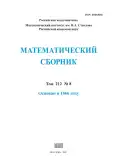Vol 212, No 8 (2021)
- Year: 2021
- Articles: 4
- URL: https://journal-vniispk.ru/0368-8666/issue/view/7480
Simple closed geodesics on regular tetrahedra in spherical space
Abstract
We prove that there are finitely many simple closed geodesics on regular tetrahedra in spherical space. Also, for any pair of coprime positive integers $(p,q)$, we find constants $\alpha_1$ and $\alpha_2$ depending on $p$ and $q$ and satisfying the inequality $\pi/3<\alpha_1<\alpha_2<2\pi/3$, such that a regular spherical tetrahedron with planar angle $\alpha\in(\pi/3, \alpha_1)$ has a unique simple closed geodesic of type $(p,q)$, up to tetrahedron isometry, whilst a regular spherical tetrahedron with planar angle $\alpha\in(\alpha_2, 2\pi/3)$ has no such geodesic.Bibliography: 19 titles.
Matematicheskii Sbornik. 2021;212(8):3-32
 3-32
3-32


Uniform convergence and asymptotics for problems in domains finely perforated along a prescribed manifold in the case of the homogenized Dirichlet condition
Abstract
A boundary value problem for a second-order elliptic equation with variable coefficients is considered in a multidimensional domain which is perforated by small holes along a prescribed manifold. Minimal natural conditions are imposed on the holes. In particular, all of these are assumed to be of approximately the same size and have a prescribed minimal distance to neighbouring holes, which is also a small parameter. The shape of the holes and their distribution along the manifold are arbitrary. The holes are divided between two sets in an arbitrary way. The Dirichlet condition is imposed on the boundaries of holes in the first set and a nonlinear Robin boundary condition is imposed on the boundaries of holes in the second. The sizes and distribution of holes with the Dirichlet condition satisfy a simple and easily verifiable condition which ensures that these holes disappear after homogenization and a Dirichlet condition on the manifold in question arises instead. We prove that the solution of the perturbed problem converges to the solution of the homogenized one in the $W_2^1$-norm uniformly with respect to the right-hand side of the equation, and an estimate for the rate of convergence that is sharp in order is deduced. The full asymptotic solution of the perturbed problem is also constructed in the case when the holes form a periodic set arranged along a prescribed hyperplane. Bibliography: 32 titles.
Matematicheskii Sbornik. 2021;212(8):33-88
 33-88
33-88


Billiard books realize all bases of Liouville foliations of integrable Hamiltonian systems
Abstract
We consider a generalization of a mathematical billiard bounded by arcs of confocal quadrics, known as billiard books. Billiard books define a large class of integrable Hamiltonian systems. In this connection the question arises of the possibility of realizing integrable Hamiltonian systems with two degrees of freedom by billiard books. The authors have proved previously that for any nondegenerate three-dimensional bifurcation ($3$-atom) a billiard book in which such a bifurcation appears can be constructed algorithmically. Based on the preceding result, we give a proof of the fact that given any base of a Liouville foliation (rough molecule), a billiard book can be constructed algorithmically such that the base of the Liouville foliation of this system is isomorphic to the one given initially. Bibliography: 15 titles.
Matematicheskii Sbornik. 2021;212(8):89-150
 89-150
89-150


On the fixed volume discrepancy of the Korobov point sets
Abstract
This paper is devoted to the study of a discrepancy-type characteristic – the fixed volume discrepancy – of Korobov point sets in the unit cube. It has been observed recently that this new characteristic allows us to obtain an optimal rate of dispersion decay. This observation has motivated us to study this new version of discrepancy thoroughly; it also seems to have independent interest. This paper extends recent results due to Temlyakov and Ullrich on the fixed volume discrepancy of Fibonacci point sets. Bibliography: 23 titles.
Matematicheskii Sbornik. 2021;212(8):151-164
 151-164
151-164











